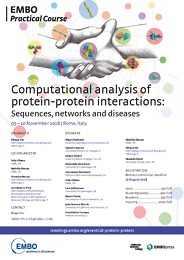About the Practical Course
Recent growth in protein-protein interaction (PPI) data provides massive opportunities for gaining biological insights, including the characterization of protein complexes and pathways. Many tools and resources exist to analyse and disseminate these data, but often bench scientists are not trained in them. In particular, they need to learn how to explore, manage, and interconnect these datasets.
Given the importance of such techniques in several biomedical science disciplines, there is a major need for training in relevant tools without which bench scientists risk missing important insights from their own data. This EMBO Practical Course aims to train participants in bioinformatics techniques for gaining a network perspective on PPIs, predicting and analysing them, highlighting differences between globular (protein "domains") and non-globular (intrinsically disordered peptide) modules, and working with large datasets. Ideal participants for this course are bench scientists who are working to obtain data related to protein-protein interactions, or already have such data they want to analyse. One of the focuses of this course will be teaching the importance of PPIs in biological systems, and how bioinformatics tools can be harnessed for understanding and controlling physiological states and when these states are perturbed by disease. Keeping these aspects into consideration, disease datasets are integrated into the training materials.
We will teach state-of-the-art bioinformatics tools, including Cytoscape, STRING, ELM, IUPRED and Chimera2. We will focus on integrating experimental interaction data (XL-MS, Bio-ID) into PPI networks. Many of the publicly available tools are highly interconnected and we will show participants how to take advantage of this integration. This course has been offered with different focuses since 2014, through which we have pioneered training in bioinformatics tools associated with the diversity and importance of PPIs involving various protein modules. The content of the course will be similar to that of an EMBO Practical Course taught in Budapest in May 2016. These pages contain all the material taught during the course, you may find it useful to look at this when deciding whether to apply for the course.
We initially focus on predicting PPI modules from protein sequences, highlighting differences (structure, function, and bioinformatics) between globular protein "domains" and non-globular intrinsically-disordered peptide regions, the latter being rich in short protein-binding regions involved in signal transduction and other functions. Understanding the differing roles these modules play in PPIs is key to unravelling the dynamism and complexity of cellular systems. The course ends by focusing on large PPI datasets, emphasizing a network perspective.
The overall impact of the course is enhanced by giving the trainees opportunities to analyse their own data in the presence of expert trainers, who are also the developers of aforementioned tools. Significant time is allocated for trainees to apply the skills learnt in the course to their own data with the trainers in attendance.
About EMBO Courses and Workshops
EMBO Courses and Workshops are selected for their excellent scientific quality and timelines, provision of good networking activities for all participants and speaker gender diversity (at least 40% of speakers must be from the underrepresented gender).
Organisers are encouraged to implement measures to make the meeting environmentally more sustainable.




